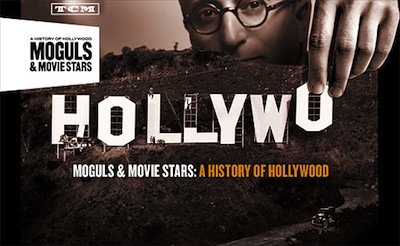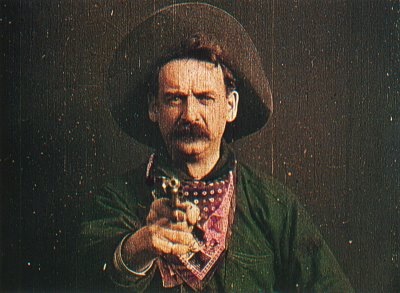 By Jennifer Baldwin. Watching old movies has been a spotty pastime for me these last few months. Working full-time as a high school English teacher leaves me with less free time than I’d like to work on my “Classic Cinema Obsession” articles, so that’s why I’ve been pretty much absent from Libertas since Mad Men ended.
By Jennifer Baldwin. Watching old movies has been a spotty pastime for me these last few months. Working full-time as a high school English teacher leaves me with less free time than I’d like to work on my “Classic Cinema Obsession” articles, so that’s why I’ve been pretty much absent from Libertas since Mad Men ended.
But even though I’ve had to cut back on the old movie obsessiveness for the time being, that doesn’t mean that I’ve gone completely cold turkey. Last month I managed to watch the new Criterion DVD of the Japanese cult horror headtrip House, and I’ve also been keeping up with TCM’s ambitious new seven-part documentary series, Moguls and Movie Stars: A History of Hollywood . I also watched The Fighting Sullivans on Veterans Day, and Dragonwyck on Halloween. And in perhaps the happiest moment of my young life, I finally bought my pass for the 2011 Turner Classic Movies Film Festival in Hollywood, California. I wanted to go the TCM Fest last year, but simply couldn’t afford it. This year I’ve got the dough, though, and there ain’t nothing that’s gonna stop me from heading to Hollywood.
 I also began writing for a new film website called Fandor, an amazing new site that allows subscribers to watch a wide variety of classic, foreign, and indie films directly on their computers. No downloads, everything is streamed on the site. And first-time subscribers get a one-month free trial, which is a great incentive to join.
I also began writing for a new film website called Fandor, an amazing new site that allows subscribers to watch a wide variety of classic, foreign, and indie films directly on their computers. No downloads, everything is streamed on the site. And first-time subscribers get a one-month free trial, which is a great incentive to join.
Along with the films, Fandor also provides written commentary and informative essays about the films and filmmakers, including articles by yours truly. My first article for Fandor was on Tarkovsky’s haunting dream film The Mirror, while my second article was on the Josef Von Sternberg/Marlene Dietrich classic, The Blue Angel. I’m also a participant in Fandor’s syndication program, which allows me to embed their films directly on my own personal blog, Dereliction Row. You can watch any of the films anytime you want if you’re a subscriber, or you can watch an individual film for a small rental fee. I’d encourage anyone who is interested in great cinema to check out Fandor.
 So even though I have been overly busy with my day job as a teacher, I haven’t completely neglected my passion for classic films. And that’s what this “Classic Movie Journal” is all about. It’s my way to keep writing about old movies for Libertas, but in a more informal, less time intensive manner. Consider these my unvarnished, rambling, and passionate musings on all things old movies. Emphasis on the unvarnished and rambling, please.
So even though I have been overly busy with my day job as a teacher, I haven’t completely neglected my passion for classic films. And that’s what this “Classic Movie Journal” is all about. It’s my way to keep writing about old movies for Libertas, but in a more informal, less time intensive manner. Consider these my unvarnished, rambling, and passionate musings on all things old movies. Emphasis on the unvarnished and rambling, please.
So what’s rattling round in my brain this week? Well, as I mentioned above, I have been watching the new TCM documentary series about the history of Hollywood, and I have to admit, I’m a little disappointed. Normally I fall down at the feet of everything TCM does, but this time I’m not feeling it.
I don’t know if my expectations were too high, but the series has not lived up to them. I just finished watching episode four, “Brother Can You Spare a Dream,” which focused on the years 1929 to 1941, and I’ve found that the show doesn’t seem able to get to the essence of its topic each week. This week’s episode was all about Hollywood during the Depression, and how sound technology revolutionized the industry – and yet it never really delved into the cultural impact of the Talkies or the way the movies affected Depression audiences. It gave a little lip service to these topics, but I never felt the grand sweep, the overall impact that the movies had during these years. Through four episodes so far, there’s been nothing epic about this series.

Part of the problem is that the show is divided in its attentions right from the start. It’s “Moguls and Movie Stars,” so the focus must be split between the businessmen and the artists. This is a pretty standard approach as far as an appraisal of Hollywood history goes, but the writing of the show has been muddled because of it. It keeps jumping back and forth between the machinations of the moguls and the rise and fall of various stars, but there’s no “through line” that connects everything to something larger. I was expecting a sort of myth-building history of America, as told through the history of Hollywood (something along the lines of Ken Burns’ Baseball documentary). Instead, it’s just a very rote, very surface documentary that breezes through its topic like a Cliffs Notes version of history.
Maybe each episode isn’t long enough? Maybe it was a mistake to break down each episode by decade? I know I would have liked more than an hour to cover the tumultuous and groundbreaking 1920s. I’m not sure how to fix the problem, but I’ve found that each episode is highly disposable and I haven’t learned anything I didn’t already know from my Film Studies 101 class. What’s even more annoying is that I was expecting these earlier episodes to be the strongest of the series, since they would be dealing with the earliest years of Hollywood in which I know very little in comparison to the more popular decades of the ‘30s, ’40, and ‘50s.

In last week’s episode, Shirley Temple was given about three minutes of screen time at most. Fred Astaire got maybe a minute. The few clips that we got were brief and usually did not include much dialogue. I mean, this is the 1930s, when dialogue was everything – and snappy, quintessentially American dialogue was the great innovation of the age. Instead, everything was pretty much thrown at the viewer in a helter skelter manner, the only guiding framework being chronology. This series needs more clever montages and filmmaking chops. As it is, it’s kinda boring.
Maybe I’m being too hard. The series is certainly professionally produced and the interviews with the relatives and descendants of the moguls at least provide some new, unique perspectives. Occasionally the documentary will delve into some little known area, such as the career of female director Alice Guy, or the pioneering work of African American filmmaker Oscar Micheaux. But overall, it’s familiar stuff. And it’s not even presented in a thrilling or heart-swelling way. If a documentary like this can’t even get a classic movie obsessed gal like me to swoon, then there’s something wrong. A series like this should get me all psyched up to go watch the movies that get mentioned in each episode. Instead, I find myself relieved when the episodes are over and not really in the mood to watch any of the movies discussed.
Maybe the final three episodes will surprise me. I haven’t watched the newest one that just aired on November 29, so there’s still time for redemption. As it stands now, though, this series has been a disappointment. Normally I worship at the altar of TCM, but not this time.
Posted on December 2nd, 2010 at 10:10am.
Jennifer – I’ve been watching the TCM series as well, and I too was underwhelmed by it. It’s basically a superficial account of film history that most people can get in any basic film history book or class. Like you though, I enjoyed the intervies with the actual families of the movie moguls and stars. I thought it was interesting to get their perspectives.
Unfortunately, I thought the biggest problem with the series was the so-called film historians that they had providing much of the analysis, especially David Brooks, who must be one of the sourest people on TV. I thought their commentary was trite and predictable, and full of the usual liberal cliches. The “experts” looked tired and out of touch and had nothing interesting to say. TCM really needs to find some new film history people to comment on these specials. Maybe some younger people for once?
Great post, Jennifer. I completely agree that TCM could have done a lot more with the series, and probably should have had each individual episode be longer. There were really no new insights to be found, which is a shame given how much time and money went into the series. I liked the footage from the early films in the first few episodes and the interviews with the family members were great to too, but beyond that, the analysis was pretty thin. But TCM does so many thing well, I’ll forgive them for this.
Thanks Govindini! The early footage was good and in general the family interviews have been the best part. TCM is such a treasure that I can’t really hate on them for this. I had high expectations going in and that’s probably part of the problem — my expectations were too high.
I wonder if they were skittish about being too in-depth and too cutting edge, afraid that they might turn off some of the older viewers or make it inaccessible to an audience that might be tuning into TCM for the first time to see the series. Sometimes it’s hard to forget that not everyone is a massive old movie junkie and cinephile. My grandmother just told me today that she’s really been enjoying the series. 😀
No doubt, Globetrottr, the film critics used on the series are pretty lame. Like you said, it’s nothing we haven’t heard a million times before. It would have been really cool if they could have gotten some internet critics, like Kim Morgan from Sunset Gun, or Matt Zoller Seitz, or Glenn Kenny, to offer commentary. David Thomson is a curmudgeon that doesn’t even seem to *like* old movies; Jeanine Basinger is as vanilla dry toast as a film critic can get; and I’ve not even heard of Cari Beauchamp before this series.
For such an “ambitious” documentary series, it doesn’t seem like they’ve put a lot effort into finding the best talking-head commentary available.
A minor footnote here, Jennifer, to your great post. Another classic movie writer they could’ve included is Kimberly Lindbergs, who actually blogs for TCM’s Movie Morlocks! She also has her own site, Cinebeats:
http://cinebeats.blogsome.com/
They really did no ‘thinking outside the box’ on this series at all.
Oh yeah, Kimberly LIndbergs would have been awesome! She’s a wonderful blogger and she actually blogs FOR TCM. That seems like a no-brainer to me.